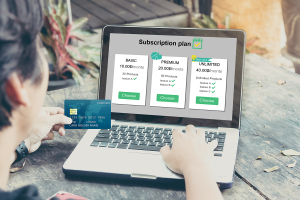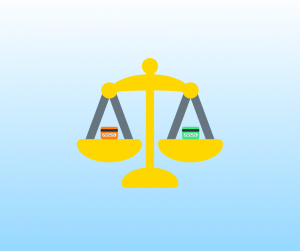Does Having No Debt Hurt Your Credit Score?

How to Rebuild Credit After a Divorce
09/30/2022
How to Build Credit After Moving to the United States
10/16/2022 When you hear the word debt, it often carries a negative connotation. You might see stories of people trying to get out of debt or being crushed by debt.
When you hear the word debt, it often carries a negative connotation. You might see stories of people trying to get out of debt or being crushed by debt.
Although household debt reached $16.15 trillion in the second quarter of 2022, most don’t consider their monthly debt payments a good thing for their budget. For those able to skirt around the financial pitfalls of debt, it’s easy to wonder how this financial success will impact your credit score.
Let’s explore whether or not avoiding debt will hurt your credit score. Plus, strategies you can implement to build credit while avoiding debt.
Myth or Fact: Does Having No Debt Hurt My Credit Score?
When it comes to credit scores, there is no shortage of myths out there.
A few persistent credit myths include the incorrect assumption that your income impacts your credit score and the incorrect fact that carrying a balance on your credit card will somehow improve your credit score.
Another big myth is that you cannot build your credit score without taking on debt. The reality is that it is possible to build credit without taking on debt. Don’t be discouraged by the nay-sayers. It’s absolutely possible to build your credit without paying a single penny in interest.
However, you’ll need to have some activity on your credit report. In some cases, you might accomplish this by opening a credit card. With responsible credit card management, you can avoid taking on debt while using the card as a tool for credit building.
What Happens If I Pay Off My Debt Early?
Getting out of debt is a challenge. Don’t let the financial freedom of becoming debt-free get derailed by the threat of a hit to your credit score.
According to Experian, paying off an installment loan could cause your credit score to dip. However, if it does dip, it’s usually a temporary situation. And in some cases, your credit score won’t be impacted negatively when you pay off installment loans.
Want to build a strategy to get out of debt? Check out the snowball and avalanche methods.
How to Build Credit Without Taking on Debt
It’s entirely possible to build your credit score without taking on debt. Below you’ll find a series of strategies that you can use for building credit without making any interest payments to unwanted debt along the way.
Check Your Credit Score
Before you start your credit-building journey, it’s important to understand where you are starting from. You can do this by checking your credit score to see where it stands.
Don’t worry! Another completely false credit myth is that checking your credit score can hurt it. In fact, you can check your credit score for free without it impacting your credit score. A few places you can find it include Experian, other credit platforms, or your credit card provider.
When you have eyes on your credit score, take a second to see how it stacks up against the credit score range. FICO scores fall in the range of 300 to 850. Here’s a quick look at the ranges:
- Poor: 300 – 579
- Fair: 580 – 669
- Good: 670 – 739
- Very good: 740 – 799
- Excellent: 800 – 850
A poor or fair credit score means you have room for improvement. Even if you have a good score, it’s useful to focus your effort on an even higher credit score. That’s because the most attractive financing options are reserved for people with very good or excellent credit.
Check Your Credit Report
In addition to checking your credit score, it’s a smart move to check your credit report.
You can think of your credit report as your report card and your credit score as a GPA. The information on the credit report influences your credit score.
If there is positive information on your credit report, you’ll likely see that reflected as a good credit score. If you have negative information, like a history of late payments, on your credit report, that’s often reflected as a bad credit score.
Sometimes, mistakes make their way onto your credit report. Since mistakes may mean a negative mark on your credit, it’s important to get errors corrected as soon as possible.
Establish Credit Accounts
It’s possible to open a credit card without taking on any debt.
Although this seems unlikely, with the U.S. family’s average credit card debt sitting at $6,569, it’s true! You can use credit cards as a tool to build your credit score.
Unless you already have one open, the process starts by applying for a new card. As you consider your credit card options, look for an opportunity that balances low fees with the perks you want. For example, you might opt for a rewards credit card to stretch your dollars a little bit further with every swipe.
The key to avoiding credit card debt is to make on-time, in-full payments each and every month. If you pay for the entire balance by the due date, you can avoid paying any interest or fees on your charges.
Make On-time Payments
Payment history accounts for 35% of your FICO score, which makes paying your credit bills by the due date incredibly important for your credit score. A history of on-time payments adds positive information to your credit report, while a history of late payments means negative marks on your credit report.
Since payment history is the most important factor in your FICO score, making a commitment to on-time payments should be your top priority.
Before assuming you have this one under control, take a look at your strengths and weakness. For some, keeping track of several bill deadlines leads to accidentally missing a due date here and there. If you are concerned you might miss a deadline, enlist the assistance of autopay technology. Since most bill providers have this option, it should help you avoid an accidentally missed payment.
However, autopay cannot solve cash flow issues. It’s entirely possible to miss a payment because you don’t have the funds available in your bank account. If you see this possibility on the horizon, reach out to the credit card issuer to explain the situation as soon as possible. In some cases, they can offer an extension while you get the funds in order.
Open a Secured Credit Card
A secured credit card is a form of secured debt. You’ll make a deposit that acts as your collateral for a credit card. Since the credit card issuer has access to your deposit, that lowers the risk for them, which often leads to an easier approval for you.
Like traditional credit cards, you can avoid paying a single cent in interest payments by making on-time payments for your full balance each and every month. Not only will these payments help you steer clear of debt, but also build a positive payment history.
But beware of the low spending limit often tied to secured credit cards. With a low limit, it’s easy to build a high credit utilization ratio, which can negatively impact your FICO score. The best utilization ratio to aim for is less than 10% for your FICO score.
Here’s how to calculate this metric:
Divide the account balance by the credit limit. For example, let’s say that you have a credit card with a $1,000 credit limit. If you have a balance of $400, then your credit utilization ratio would be 40%. If possible, try to keep your credit utilization ratio at less than 10% to avoid negative impacts on your FICO score.
Become an Authorized User
If you aren’t comfortable opening a credit card of your own or don’t have a good enough credit score to get approved, then becoming an authorized user can be a helpful opportunity.
For some looking to build credit, a family member or friend may be willing to add you as an authorized user to their credit accounts. Although the results vary, getting added to a credit card account in good standing may build credit. Depending on your situation, this possibility is worth a shot.
Get Credit for Alternative Payments
If you have no interest in touching a credit card, that’s understandable. All too often, the slippery slope of easy access to a line of credit leads to a mountain of debt. That’s likely how many American families ended up with an average of $6,569 in credit card debt. After all, life gets expensive and can throw costly surprises your way.
According to Americor, the top five reasons for credit card debt include overspending, lack of an emergency fund, medical expenses, divorce, and sticking with only the minimum payment. If you think you are at risk of leaning a little bit too heavily on your credit card, it might be better to avoid the temptation altogether.

The good news is that you can build credit without even touching a credit card. That’s made possible by getting credit for alternative payments with non-credit accounts.
A few of the alternative payments that could build your credit history include:
- Subscription streaming services
- Utilities
- Rent
- Cell phone plans
Although these aren’t regular credit accounts that build credit automatically, they could if you work with the right service. Importantly, the account must be in your name. So, if you are splitting the Netflix bill with your sister, you won’t get credit for the payments unless the account is in your name and paid from your bank accounts.
A few different services offer the chance to get credit for your alternative credit data. Some top options include:
- Experian Boost: This free service pulls in your payment information from your bank account records about certain bills. According to the platform, the average user sees their credit score rise by 13 points.
- Rental Kharma: Making rent payments on time is a significant milestone. Rental Kharma reports those on-time payments to both TransUnion and Equifax. There’s a $50 set-up fee and an $8.95 monthly reporting fee. If you add a spouse or roommate, there’s an additional $25 set-up fee and a $5 monthly surcharge added to the cost.
- Rent Reports: Rent Reports sends your rent payment history information to Equifax and TransUnion on a monthly basis. The service costs $9.95 per month or $95.4 per year, with a $94.95 set-up fee.
If you are looking to build credit without opening any credit accounts, these alternative payment options give you an opportunity.
Use Credit Repair
We’ve already mentioned that incorrect credit information can drag your credit score down.
That’s because mistakes are usually not a good thing for your credit report. After all, it’s unlikely the fraudster who stole your credit card information is going to start making on-time payments. But even a more innocent mix-up with a lender can have negative consequences.
Luckily, it’s possible to remove incorrect negative information through credit repair. You can either work with a reputable credit repair service or go the DIY route.
In order to go it alone, the first step is to identify any mistakes on your credit report. From there, contact the credit bureau to ask for a correction. Be ready to provide details about the issue. Typically, the request will be resolved within a month or so. It’s relatively easy to tackle this for a handful of mistakes. But victims of extensive identity theft may benefit from working with a credit repair service.
Want to go the DIY route? Check out this free resource.
The Bottom Line
If you are looking for a way to build credit without taking on debt, you have many options.
Take the time to determine the right strategies for your specific financial goals. For example, if you aren’t comfortable opening a line of credit at all, then becoming an authorized user or getting credit for alternative payments might be a better solution for you.
Regardless of the credit-building strategy you choose, it is critical to be patient. In most cases, it will take several months to see a marked improvement in your credit score. But sometimes, it can take even longer. All you can do is stick with a proven strategy that works for your comfort level.
Want to build credit faster? Check out our guide to the fastest ways to build credit through credit piggybacking.






